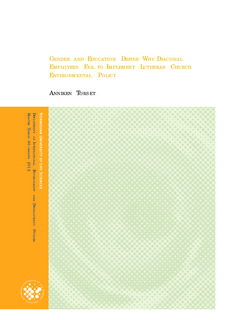| dc.description.abstract | Why does the Church Care for the Environment? Value Orientation Among the ELCN’s Diaconal Employees: Abstract: In 2007, the Evangelical Lutheran Church of Norway (ELCN) included environmental stewardship in its definition of diakonia. In the ELCN’s national plan for the diaconal ministry, it emphasizes nature’s intrinsic value, and highlighs that stewardship is a biospheric commission. Neither before nor after ELCN’s new definition and plan of diakonia was established, has research examined value
orientation among local diaconal employees. Using a survey based upon the New Ecological Paradigm (NEP) and Schwartz value scale, information on value
orientation from 115 deacons, deacon workers, and deacon advisors was gathered. Because the Schwartz scale does not measure local value orientation, additional data from another survey designed for Paper II in this thesis was used. A majority of the survey respondents held an altruistic, rather than biospheric, value orientation,
indicating that ELCN biospheric policy has low support among local diaconal employees. Correlations with demographic factors were considered, but varied too much to fully explain value orientation. Why Diaconal Employees Are Not Motivated to Walk the Talk of Stewardship: Abstract: In 2007, the Evangelical Lutheran Church of Norway (ELCN) officially changed from a social altruistic to a biospheric value orientation, when including environmental protection as part of its diaconal ministry. Despite ELCN’s official change, results from Paper I suggest that diaconal employees still maintain altruistic value orientation. To explain why diaconal employees have not adapted ELCN’s biospheric value orientation, a combined quantitative and qualitative approach was used. Two online surveys were sent to all ELCN diaconal employees. In addition, study leaders at the master programs in diakonia were interviewed. Data were
gathered on diaconal employees’ knowledge, attitude, and practice correlated with environmental protection and stewardship. Gender and education were the core variables explaining environmental attitude and value orientation. Pro-environmental affective attitude was positively correlated with men and higher education. Proenvironmental cognitive attitude was positively correlated with men, higher education, and older age. Pro-environmental conative attitude and behavior correlated positively with men, higher education, young age, and working in urban or semiurban areas. | no_NO |
